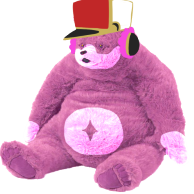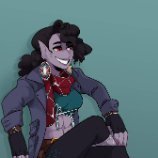The way I see it, writing dialogue for a character boils down to two important points.
You have a solid idea of who your character is, what their motivations, personality, etc are. You are able to put yourself into your character's shoes and understand their perspectives during situations in which they speak.
The character does not need to have any deep, tragic backstory or personality with 50 hidden layers. It just needs to be something solid. In fact, too many tragic backstories tend to make the viewer more jaded in terms of that kind of thing. As long as you know what your character is, you should be able to work dialogue.
It does not have to be quirks like verbal tics. Like Commander said, alteration in vocabulary and preferred word choices are the best way to get this across. English may not have as much character in its language but it's something we can manipulate well enough to fit our needs.
For example, my own fan game idea has a pair of characters who are basically a pop idol duo (and a pair of gym leaders). One, who I'll refer to as YH, is far more energetic and outgoing (but not air headed) while the other, who I will refer to as MH, who is more calm and subdued, though not shy. If you ask them the following question (Do you love singing and why?), they will answer the following.
YH: Of course, I love singing! Isn't that pretty obvious? I mean, that feeling of your heart pounding while you expose and share your emotions for the world through song is so much fun. Plus, singing with MH always gives me a rush. That resonance we have is pure bliss.
MH: M-hmm. I do. Singing is one of those rare things that allow me to share my emotions with the world. For someone like me who people poked fun at for being so subdued, being able to share your emotions at their pinnacle is a wonderful feeling…Ahh…singing with YH also helps that. I think it's because we've been joined at the hip since we were kids but singing with her always feels really nice.
As you can see, these two basically gave the same answer but each fits their respective personalities (though I did just write that all on the fly). By creating a difference in word choice and mannerisms based on a personality you can understand, the character's dialogue can become very well-integrated with and indicative of their personalities.
It all boils down to how well you understand the character you've created, how much you've solidified them, and how well you can put yourself into their shoes and thought patterns.










